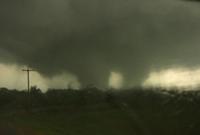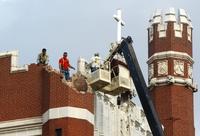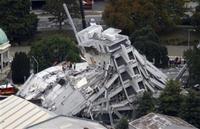-
Real disasters hurt annual national disaster drill

This year the federal government’s annual nationwide disaster drill was hampered by actual disasters; due to an unusually severe series of natural disasters across the country, several states, local agencies, and federal employees were unable to participate in the Federal Emergency Management Agency’s National Level Exercise as they were too responding to real emergencies
-
-
Oklahoma hit by six earthquakes in four days

On Sunday residents of Oklahoma were shook by their sixth earthquake in four days; these quakes come in the wake of Oklahoma’s strongest earthquake on record, which struck the state on 5 November; the 5.6 magnitude tremor damaged dozens of homes and caused a freeway to buckle
-
-
Mind-Alliance joins UN Disaster Risk Reduction Private Sector Partnership

More than 200 million people are affected by disasters each year and in 2010 at least 300,000 people died in major disaster events; annual reported disaster losses now regularly exceed $100 billion; Mind-Alliance, a developer of Information Sharing Management software for homeland security, emergency preparedness, and business continuity professionals, has joined the UN Disaster Risk Reduction Private Sector Partnership
-
-
How disaster survivors survive Thanksgiving
This year’s rash of deadly natural disasters has displaced tens of thousands of people and shattered families across the United States; with the Thanksgiving holiday approaching, many will find it impossible to celebrate in their own home or be forced to face an empty seat once occupied by a loved one
-
-
USDA declares NY and PA counties disaster zones
The U.S. Department of Agriculture (USDA) recently announced that several counties Pennsylvania and New York are now eligible for federal disaster aid
-
-
Japanese VC invests in disaster data recovery specialist
Sumitomo’s U.S.-based venture investment arm, Presidio Ventures, has made an investment in Axxana, a specialist in data protection in the event of disasters
-
-
Building design lessons from the Christchurch earthquake

A leading infrastructure expert believes an assessment needs to be made of the level of “very rare” earthquake that needs to be considered in structural design, perhaps one with a 10,000 year return period or higher, rather than the 500 year return period that is commonly adopted for many buildings in Australia
-
-
Plan to protect Houston from the next big hurricane

To protect Houston and Galveston from future hurricanes, experts recommends building a floodgate across the Houston Ship Channel, adding new levees to protect densely populated areas on Galveston Island and the developed west side of Galveston Bay; the team also recommends creating a 130-mile-long coastal recreation area to sustainably use wetlands that act as a natural flood barrier
-
-
States over reliant on FEMA aid for small disasters
This year’s unprecedented number of major natural disasters including Hurricane Irene, the record number of tornadoes, and the floods along the entire Mississippi and Missouri rivers strained the Federal Emergency Management’s (FEMA) coffers, but the number of relatively minor disasters that were declared as “major disasters” pushed FEMA resources beyond their limit; some critics say this trend needs to stop
-
-
Giving hardware a second life in disasters
A software version of CharTec BDR appliance enables CharTec’s partners to provide backup and disaster recovery offerings by reusing existing hardware or BDR solutions
-
-
Costly October disasters worldwide
October saw devastating — and costly — natural disasters in different parts of the world; in Thailand, the flooding has impacted 64 of Thailand’s 77 provinces, affecting more than 9.9 million people with at least 427 reported dead. Preliminary economic losses have been listed at $9.8 billion, with insured losses already estimated at more than $4.6 billion
-
-
Eight months later, Fukushima reactor could still be active
Troubles continue at the beleaguered Fukushima Daichii nuclear power plant in Japan with officials detecting radioactive xenon gas, a byproduct of nuclear fission, from reactor two nearly eight months after the dangerous meltdowns
-
-
Meth lab found in FEMA temporary housing in Joplin

Following the devastating tornado that leveled Joplin, Missouri in May, thousands of residents were forced to take up temporary housing in FEMA mobile home parks, but of late many have become increasingly uneasy about their living situation following the discovery of a methamphetamine lab in a FEMA temporary housing complex
-
-
Air pollution in Arabian Sea linked to cyclone intensity
Pollution is making Arabian Sea cyclones more intense, according to a just-published study; traditionally, prevailing wind shear patterns prohibit cyclones in the Arabian Sea from becoming major storms; the new study suggests that weakening winds have enabled the formation of stronger cyclones in recent years
-
-
Army engineers need $1 billion to repair damaged levees
The U.S. Army Corps of Engineers is urgently requesting $1 billion to repair flood control systems along the Mississippi and Missouri river basins following damage from record floods this spring; the historic flooding forced the corps to blow up portions of the levee to relieve pressure, flooding thousands of acres of farmland to protect cities along the rivers
-
More headlines
The long view
Using Drone Swarms to Fight Forest Fires
Forest fires are becoming increasingly catastrophic across the world, accelerated by climate change. Researchers are using multiple swarms of drones to tackle natural disasters like forest fires.
How Climate Change Will Affect Conflict and U.S. Military Operations
“People talk about climate change as a threat multiplier,” said Karen Sudkamp, an associate director of the Infrastructure, Immigration, and Security Operations Program within the RAND Homeland Security Research Division. “But at what point do we need to start talking about the threat multiplier actually becoming a significant threat all its own?”
